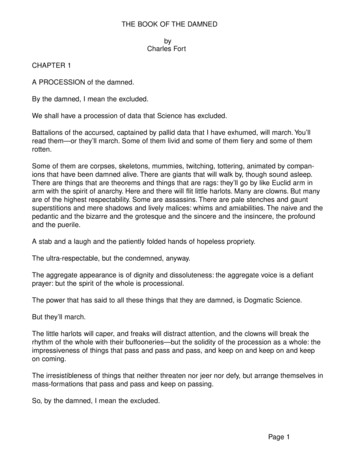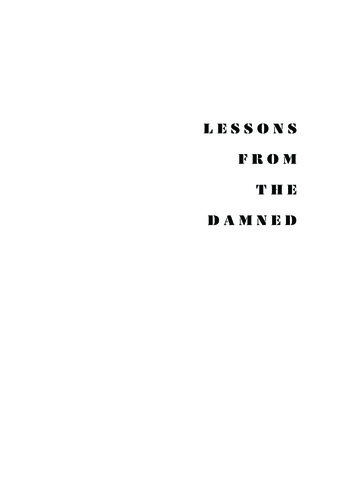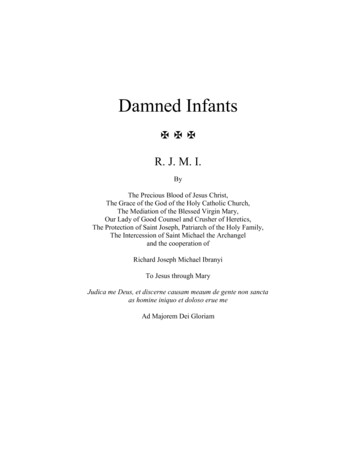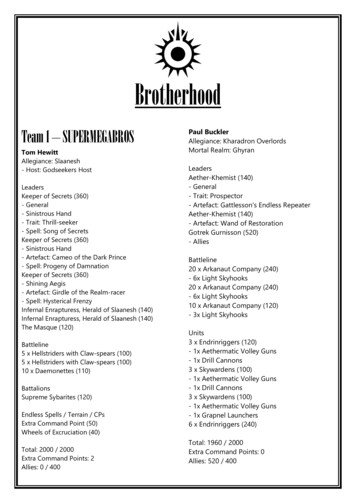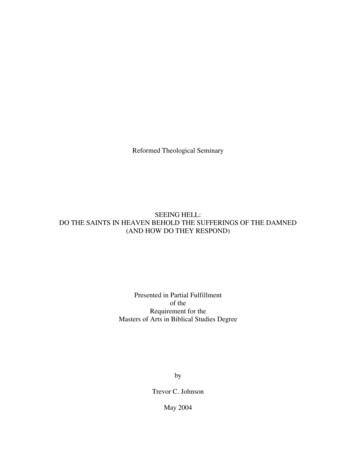![The Book Of The Damned, By Charles Fort, [1919], At Sacred .](/img/24/book-of-the-damned.jpg)
Transcription
The Book of the Damned, by Charles Fort, [1919], at sacred-texts.comTHE BOOK OF THE DAMNEDby CHARLES FORTNew York: BONI AND LIVERIGHT, INC.[1919]Scanned, proofed and formatted by John Bruno Hare at sacred-texts.com, July 2008.This text is in the public domain in the US because it was published prior to1923.Click to enlargeCharles FortThe Book of the Damned, by Charles Fort, [1919], at sacred-texts.com[p. 1] [p. 2][p. 3]1A PROCESSION of the damned.By the damned, I mean the excluded.We shall have a procession of data that Science has excluded.Battalions of the accursed, captained by pallid data that I have exhumed, willmarch. You'll read them--or they'll march. Some of them livid and some of themfiery and some of them rotten.Some of them are corpses, skeletons, mummies, twitching, tottering, animated bycompanions that have been damned alive. There are giants that will walk by, thoughsound asleep. There are things that are theorems and things that are rags: they'llgo by like Euclid arm in arm with the spirit of anarchy. Here and there will flitlittle harlots. Many are clowns. But many are of the highest respectability. Someare assassins. There are pale stenches and gaunt superstitions and mere shadowsand lively malices: whims and amiabilities. The naive and the pedantic and thebizarre and the grotesque and the sincere and the insincere, the profound and thepuerile.
A stab and a laugh and the patiently folded hands of hopeless propriety.The ultra-respectable, but the condemned, anyway.The aggregate appearance is of dignity and dissoluteness: the aggregate voice is adefiant prayer: but the spirit of the whole is processional.The power that has said to all these things that they are damned, is DogmaticScience.But they'll march.The little harlots will caper, and freaks will distract attention, and the clownswill break the rhythm of the whole with their buffooneries--but the solidity ofthe procession as a whole: the impressiveness[p. 4]of things that pass and pass and pass, and keep on and keep on and keep on coming.The irresistibleness of things that neither threaten nor jeer nor defy, butarrange themselves in mass-formations that pass and pass and keep on passing.So, by the damned, I mean the excluded.But by the excluded I mean that which will some day be the excluding.Or everything that is, won't be.And everything that isn't, will be-But, of course, will be that which won't be-It is our expression that the flux between that which isn't and that which won'tbe, or the state that is commonly and absurdly called "existence," is a rhythm ofheavens and hells: that the damned won't stay damned; that salvation only precedesperdition. The inference is that some day our accursed tatterdemalions will besleek angels. Then the sub-inference is that some later day, back they'll gowhence they came.It is our expression that nothing can attempt to be, except by attempting toexclude something else: that that which is commonly called "being" is a state thatis wrought more or less definitely proportionately to the appearance of positivedifference between that which is included and that which is excluded.But it is our expression that there are no positive differences: that all thingsare like a mouse and a bug in the heart of a cheese. Mouse and a bug: no twothings could seem more unlike. They're there a week, or they stay there a month:both are then only transmutations of cheese. I think we're all bugs and mice, andare only different expressions of an all-inclusive cheese.Or that red is not positively different from yellow: is only another degree ofwhatever vibrancy yellow is a degree of: that red and yellow are continuous, orthat they merge in orange.So then that, if, upon the basis of yellowness and redness, Science should attemptto classify all phenomena, including all red things as veritable, and excludingall yellow things as false or illusory, the
[p. 5]demarcation would have to be false and arbitrary, because things colored orange,constituting continuity, would belong on both sides of the attempted border-line.As we go along, we shall be impressed with this:That no basis for classification, or inclusion and exclusion, more reasonable thanthat of redness and yellowness has ever been conceived of.Science has, by appeal to various bases, included a multitude of data. Had it notdone so, there would be nothing with which to seem to be. Science has, by appealto various bases, excluded a multitude of data. Then, if redness is continuouswith yellowness: if every basis of admission is continuous with every basis ofexclusion, Science must have excluded some things that are continuous with theaccepted. In redness and yellowness, which merge in orangeness, we typify alltests, all standards, all means of forming an opinion-Or that any positive opinion upon any subject is illusion built upon the fallacythat there are positive differences to judge by--That the quest of allintellection has been for something--a fact, a basis, a generalization, law,formula, a major premise that is positive: that the best that has ever been donehas been to say that some things are self-evident--whereas, by evidence we meanthe support of something else-That this is the quest; but that it has never been attained; but that Science hasacted, ruled, pronounced, and condemned as if it had been attained.What is a house?It is not possible to say what anything is, as positively distinguished fromanything else, if there are no positive differences.A barn is a house, if one lives in it. If residence constitutes houseness, becausestyle of architecture does not, then a bird's nest is a house: and human occupancyis not the standard to judge by, because we speak of dogs' houses; nor material,because we speak of snow houses of Eskimos--or a shell is a house to a hermitcrab--or was to the mollusk that made it--or things seemingly so positivelydifferent as the White House at Washington and a shell on the seashore are seen tobe continuous.So no one has ever been able to say what electricity is, for instance.[p. 6][paragraph continues] It isn't anything, as positively distinguished from heat ormagnetism or life. Metaphysicians and theologians and biologists have tried todefine life. They have failed, because, in a positive sense, there is nothing todefine: there is no phenomenon of life that is not, to some degree, manifest inchemism, magnetism, astronomic motions.White coral islands in a dark blue sea.Their seeming of distinctness: the seeming of individuality, or of positivedifference one from another--but all are only projections from the same seabottom. The difference between sea and land is not positive. In all water there issome earth: in all earth there is some water.
So then that all seeming things are not things at all, if all are intercontinuous, any more than is the leg of a table a thing in itself, if it is only aprojection from something else: that not one of us is a real person, if,physically, we're continuous with environment; if, psychically, there is nothingto us but expression of relation to environment.Our general expression has two aspects:Conventional monism, or that all "things" that seem to have identity of their ownare only islands that are projections from something underlying, and have no realoutlines of their own.But that all "things," though only projections, are projections that are strivingto break away from the underlying that denies them identity of their own.I conceive of one inter-continuous nexus, in which and of which all seeming thingsare only different expressions, but in which all things are localizations of oneattempt to break away and become real things, or to establish entity or positivedifference or final demarcation or unmodified independence--or personality orsoul, as it is called in human phenomena-That anything that tries to establish itself as a real, or positive, or absolutesystem, government, organization, self, soul, entity, individuality, can soattempt only by drawing a line about itself, or about the inclusions thatconstitute itself, and damning or excluding, or breaking away from, all other"things":That, if it does not so act, it cannot seem to be;[p. 7]That, if it does so act, it falsely and arbitrarily and futilely and disastrouslyacts, just as would one who draws a circle in the sea, including a few waves,saying that the other waves, with which the included are continuous, arepositively different, and stakes his life upon maintaining that the admitted andthe damned are positively different.Our expression is that our whole existence is animation of the local by an idealthat is realizable only in the universal: That, if all exclusions are false,because always are included and excluded continuous: that if all seeming ofexistence perceptible to us is the product of exclusion, there is nothing that isperceptible to us that really is: that only the universal can really be.Our especial interest is in modern science as a manifestation of this one ideal orpurpose or process:That it has falsely excluded, because there are no positive standards to judge by:that it has excluded things that, by its own pseudo-standards, have as much rightto come in as have the chosen.Our general expression:That the state that is commonly and absurdly called "existence," is a flow, or acurrent, or an attempt, from negativeness to positiveness, and is intermediate toboth.By positiveness we mean:
Harmony, equilibrium, order, regularity, stability, consistency, unity, realness,system, government, organization, liberty, independence, soul, self, personality,entity, individuality, truth, beauty, justice, perfection, definiteness-That all that is called development, progress, or evolution is movement toward, orattempt toward, this state for which, or for aspects of which, there are so manynames, all of which are summed up in the one word "positiveness."At first this summing up may not be very readily acceptable. At first it may seemthat all these words are not synonyms: that "harmony" may mean "order," but thatby "independence," for instance, we do not mean "truth," or that by "stability" wedo not mean "beauty," or "system," or "justice."I conceive of one inter-continuous nexus, which expresses itself[p. 8]in astronomic phenomena, and chemic, biologic, psychic, sociologic: that it iseverywhere striving to localize positiveness: that to this attempt in variousfields of phenomena--which are only quasi-different--we give different names. Wespeak of the "system" of the planets, and not of their "government": but inconsidering a store, for instance, and its management, we see that the words areinterchangeable. It used to be customary to speak of chemic equilibrium, but notof social equilibrium: that false demarcation has been broken down. We shall seethat by all these words we mean the same state. As every-day conveniences, or interms of common illusions, of course, they are not synonyms. To a child an earthworm is not an animal. It is to the biologist.By "beauty," I mean that which seems complete.Obversely, that the incomplete, or the mutilated, is the ugly.Venus de Milo.To a child she is ugly.When a mind adjusts to thinking of her as a completeness, even though, byphysiologic standards, incomplete, she is beautiful.A hand thought of only as a hand, may seem beautiful.Found on a battlefield--obviously a part--not beautiful.But everything in our experience is only a part of something else that in turn isonly a part of still something else--or that there is nothing beautiful in ourexperience: only appearances that are intermediate to beauty and ugliness--thatonly universality is complete: that only the complete is the beautiful: that everyattempt to achieve beauty is an attempt to give to the local the attribute of theuniversal.By stability, we mean the immovable and the unaffected. But all seeming things areonly reactions to something else. Stability, too, then, can be only the universal,or that besides which there is nothing else. Though some things seem to have--orhave--higher approximations to stability than have others, there are, in ourexperience, only various degrees of intermediateness to stability and instability.Every man, then, who works for stability under its various names of "permanency,""survival," duration," is striving to localize in something the state that is
realizable only in the universal.By independence, entity, and individuality, I can mean only that[p. 9]besides which there is nothing else, if given only two things, they must becontinuous and mutually affective, if everything is only a reaction to somethingelse, and any two things would be destructive of each other's independence,entity, or individuality.All attempted organizations and systems and consistencies, some approximating farhigher than others, but all only intermediate to Order and Disorder, faileventually because of their relations with outside forces. All are attemptedcompletenesses. If to all local phenomena there are always outside forces, theseattempts, too, are realizable only in the state of completeness, or that to whichthere are no outside forces.Or that all these words are synonyms, all meaning the state that we call thepositive state-That our whole "existence" is a striving for the positive state. The amazingparadox of it all:That all things are trying to become the universal by excluding other things.That there is only this one process, and that it does animate all expressions, inall fields of phenomena, of that which we think of r as one inter-continuousnexus:The religious and their idea or ideal of the soul. They mean distinct, stableentity, or a state that is independent, and not a mere flux of vibrations orcomplex of reactions to environment, continuous with environment, merging awaywith an infinitude of other interdependent complexes.But the only thing that would not merge away into something else would be thatbesides which there is nothing else.That Truth is only another name for the positive state, or that the quest forTruth is the attempt to achieve positiveness:Scientists who have thought that they were seeking Truth, but who were trying tofind out astronomic, or chemic, or biologic truths. But Truth is that besideswhich there is nothing: nothing to modify it, nothing to question it, nothing toform an exception: the all-inclusive, the complete-By Truth I mean the Universal.So chemists have sought the true, or the real, and have always failed in theirendeavors, because of the outside relations of chemical[p. 10]phenomena: have failed in the sense that never has a chemical law, withoutexceptions, been discovered: because chemistry is continuous with astronomy,physics, biology--For instance, if the sun should greatly change its distance fromthis earth, and if human life could survive, the familiar chemic formulas would nolonger work out: a new science of chemistry would have to be learned
Or that all attempts to find Truth in the special are attempts to find theuniversal in the local.And artists and their striving for positiveness, under the name of "harmony"--buttheir pigments that are , or are responding to a deranging environment--or thestrings of musical instruments that are differently and disturbingly adjusting tooutside chemic and thermal and gravitational forces--again and again this onenessof all ideals, and that it is the attempt to be, or to achieve, locally, thatwhich is realizable only universally. In our experience there is onlyintermediateness to harmony and discord. Harmony is that besides which there areno outside forces.And nations that have fought with only one motive: for individuality, or entity,or to be real, final nations, not subordinate to, or parts of, other nations. Andthat nothing but intermediateness has ever been attained, and that history isrecord of failures of this one attempt, because there always have been outsideforces, or other nations contending for the same goal.As to physical things, chemic, mineralogic, astronomic, it is not customary to saythat they act to achieve Truth or Entity, but it is understood that all motionsare toward Equilibrium: that there is no motion except toward Equilibrium, ofcourse always away from some other approximation to Equilibrium.All biologic phenomena act to adjust: there are no biologic actions other thanadjustments.Adjustment is another name for Equilibrium. Equilibrium is the Universal, or thatwhich has nothing external to derange it. But that all that we call "being" ismotion: and that all motion is the expression, not of equilibrium, but ofequilibrating, or of unattained: that life-motions are expressions of equilibriumunattained: that all thought relates to the unattained: that to have what iscalled being in our quasi-state, is not to be in the[p. 11]positive sense, or is to be intermediate to Equilibrium and Inequilibrium.So then:That all phenomena in our intermediate state, or quasi-state, represent this oneattempt to organize, stabilize, harmonize, individualize--or to positivize, or tobecome real:That only to have seeming is to express failure or intermediateness to finalfailure and final success;That every attempt--that is observable--is defeated by Continuity, or by outsideforces--or by the excluded that are continuous with the included:That our whole "existence" is an attempt by the relative to be the absolute, or bythe local to be the universal.In this book, my interest is in this attempt as manifested in modern science:That it has attempted to be real, true, final, complete, absolute: That, if theseeming of being, here, in our quasi-state, is the product of exclusion that isalways false and arbitrary, if always are included and excluded continuous, the
whole seeming system, or entity, of modern science is only quasi-system, or quasientity, wrought by the same false and arbitrary process as that by which the stillless positive system that preceded it, or the theological system, wrought theillusion of its being.In this book, I assemble some of the data that I think are of the falsely andarbitrarily excluded.The data of the damned.I have gone into the outer darkness of scientific and philosophical transactionsand proceedings, ultra-respectable, but covered with the dust of disregard. I havedescended into journalism. I have come back with the quasi-souls of lost data.They will march.As to the logic of our expressions to come-That there is only quasi-logic in our mode of seeming:That nothing ever has been proved-Because there is nothing to prove.When I say that there is nothing to prove, I mean that to those[p. 12]who accept Continuity, or the merging away of all phenomena into other phenomena,without positive demarcations one from another, there is, in a positive sense, noone thing. There is nothing to prove.For instance nothing can be proved to be an animal--because animalness andvegetableness are not positively different. There are some expressions of lifethat are as much vegetable as animal, or that represent the merging of animalnessand vegetableness. There is then no positive test, standard, criterion, means offorming an opinion. As distinct from vegetables, animals do not exist. There isnothing to prove. Nothing could be proved to be good, for instance. There isnothing in our "existence" that is good, in a positive sense, or as reallyoutlined from evil. If to forgive be good in times of peace, it is evil inwartime. There is nothing to prove: good in our experience is continuous with, oris only another aspect of evil.As to what I'm trying to do now--I accept only. If I can't see universally, I onlylocalize.So, of course then, that nothing ever has been proved:That theological pronouncements are as much open to doubt as ever they were, butthat, by a hypnotizing process, they became dominant over the majority of minds intheir era;That, in a succeeding era, the laws, dogmas, formulas, principles, ofmaterialistic science never were proved, because they are only localizationssimulating the universal; but that the leading minds of their era of dominancewere hypnotized into more or less firmly believing them.Newton's three laws, and that they are attempts to achieve positiveness, or to
defy and break Continuity, and are as unreal as are all other attempts to localizethe universal:That, if every observable body is continuous, mediately or immediately, with allother bodies, it cannot be influenced only by its own inertia, so that there is noway of knowing what the phenomena of inertia may be; that, if all things arereacting to an infinitude of forces, there is no way of knowing what the effectsof only one impressed force would be; that if every reaction is continuous withits action, it cannot be conceived of as a whole, and[p. 13]that there is no way of conceiving what it might be equal and opposite to-Or that Newton's three laws are three articles of faith;Or that demons and angels and inertias and reactions are all mythologicalcharacters;But that, in their eras of dominance, they were almost as firmly believed in as ifthey had been proved.Enormities and preposterousnesses will march.They will be "proved" as well as Moses or Darwin or Lyell ever "proved" anything.We substitute acceptance for belief.Cells of an embryo take on different appearances in different eras.The more firmly established, the more difficult to change.That social organism is embryonic.That firmly to believe is to impede development.That only temporarily to accept is to facilitate.But:Except that we substitute acceptance for belief, our methods will be theconventional methods; the means by which every belief has been formulated andsupported: or our methods will be the methods of theologians and savages andscientists and children. Because, if all phenomena are continuous, there can be nopositively different methods. By the inconclusive means and methods of cardinalsand fortune tellers and evolutionists and peasants, methods which must beinconclusive, if they relate always to the local, and if there is nothing local toconclude, we shall write this book.If it function as an expression of its era, it will prevail.All sciences begin with attempts to define.Nothing ever has been defined.Because there is nothing to define.
Darwin wrote The Origin of Species.He was never able to tell what he meant by a "species."[p. 14]It is not possible to define.Nothing has ever been finally found out.Because there is nothing final to find out.It's like looking for a needle that no one ever lost in a haystack that neverwas-But that all scientific attempts really to find out something, whereas reallythere is nothing to find out, are attempts, themselves, really to be something.A seeker of Truth. He will never find it. But the dimmest of possibilities--he mayhimself become Truth.Or that science is more than an inquiry:That it is a pseudo-construction, or a quasi-organization: that it is an attemptto break away and locally establish harmony, stability, equilibrium, consistency,entityDimmest of possibilities--that it may succeed.That ours is a pseudo-existence, and that all appearances in it partake of itsessential fictitiousness-But that some appearances approximate far more highly to the positive state thando others.We conceive of all "things" as occupying gradations, or steps in series betweenpositiveness and negativeness, or realness and unrealness: that some seemingthings are more nearly consistent, just, beautiful, unified, individual,harmonious, stable--than others.We are not realists. We are not idealists. We are intermediatists--that nothing isreal, but that nothing is unreal: that all phenomena are approximations one way orthe other between realness and unrealness.So then:That our whole quasi-existence is an intermediate stage between positiveness andnegativeness or realness and unrealness. Like purgatory, I think.But in our summing up, which was very sketchily done, we omitted to make clearthat Realness is an aspect of the positive state.By Realness, I mean that which does not merge away into something else, and thatwhich is not partly something else: that which[p. 15]
is not a reaction to, or an imitation of, something else. By a real hero, we meanone who is not partly a coward, or whose actions and motives do not merge awayinto cowardice. But, if in Continuity, all things do merge, by Realness, I meanthe Universal, besides which there is nothing with which to merge.That, though the local might be universalized, it is not conceivable that theuniversal can be localized: but that high approximations there may be, and thatthese approximate successes may be translated out of Intermediateness intoRealness--quite as, in a relative sense, the industrial world recruits itself bytranslating out of unrealness, or out of the seemingly less real imaginings ofinventors, machines which seem, when set up in factories, to have more of Realnessthan they had when only imagined.That all progress, if all progress is toward stability, organization, harmony,consistency, or positiveness, is the attempt to become real.So, then, in general metaphysical terms, our expression is that, like a purgatory,all that is commonly called "existence," which we call Intermediateness, is quasiexistence, neither real nor unreal, but expression of attempt to become real, orto generate for or recruit a real existence.Our acceptance is that Science, though usually thought of so specifically, or inits own local terms, usually supposed to be a prying into old bones, bugs,unsavory messes, is an expression of this one spirit animating allIntermediateness: that, if Science could absolutely exclude all data but its ownpresent data, or that which is assimilable with the present quasi-organization, itwould be a real system, with positively definite outlines--it would be real.Its seeming approximation to consistency, stability, system--positiveness orrealness--is sustained by damning the irreconcilable or the unassimilable-All would be well.All would be heavenly-If the damned would only stay damned.The Book of the Damned, by Charles Fort, [1919], at sacred-texts.com[p. 16]2IN the autumn of 1883, and for years afterward, occurred brilliant-coloredsunsets, such as had never been seen before within the memory of all observers.Also there were blue moons.I think that one is likely to smile incredulously at the notion of blue moons.Nevertheless they were as common as were green suns in 1883.Science had to account for these unconventionalities. Such publications as Natureand Knowledge were besieged with inquiries.I suppose, in Alaska and in the South Sea Islands, all the medicine men weresimilarly upon trial.
Something had to be thought of.Upon the 28th of August, 1883, the volcano of Krakatoa, of the Straits of Sunda,had blown up.Terrific.We're told that the sound was heard 2,000 miles, and that 36,380 persons werekilled. Seems just a little unscientific, or impositive, to me: marvel to me we'renot told 2,163 miles and 36,387 persons. The volume of smoke that went up musthave been visible to other planets--or, tormented with our crawlings andscurryings, the earth complained to Mars; swore a vast black oath at us.In all text-books that mention this occurrence--no exception so far so I haveread--it is said that the extraordinary atmospheric effects of 1883 were firstnoticed in the last of August or the first of September.That makes a difficulty for us.It is said that these phenomena were caused by particles of volcanic dust thatwere cast high in the air by Krakatoa.This is the explanation that was agreed upon in 1883-But for seven years the atmospheric phenomena continued--Except that, in theseven, there was a lapse of several years and where was the volcanic dust all thattime?[p. 17]You'd think that such a question as that would make trouble?Then you haven't studied hypnosis. You have never tried to demonstrate to ahypnotic that a table is not a hippopotamus. According to our general acceptance,it would be impossible to demonstrate such a thing. Point out a hundred reasonsfor saying that a hippopotamus is not a table: you'll have to end up agreeing thatneither is a table a table--it only seems to be a table. Well, that's what thehippopotamus seems to be. So how can you prove that something is not somethingelse, when neither is something else some other thing? There's nothing to prove.This is one of the profundities that we advertised in advance.You can oppose an absurdity only with some other absurdity. But Science isestablished preposterousness. We divide all intellection: the obviouslypreposterousness and the established.But Krakatoa: that's the 'explanation that the scientists gave. I don't know whatwhopper the medicine men told.We see, from the start, the very strong inclination of science to deny, as much asit can, external relations of this earth.This book is an assemblage of data of external relations of this earth. We takethe position that our data have been damned, upon no consideration for individualmerits or demerits, but in conformity with a general attempt to hold out forisolation of this earth. This is attempted positiveness. We take the position thatscience can no more succeed than, in a similar endeavor, could the Chinese, or
than could the United States. So then, with only pseudo-consideration of thephenomena of 1883, or as an expression of positivism in its aspect of isolation,or unrelatedness, scientists have perpetrated such an enormity as suspension ofvolcanic dust seven years in the air--disregarding the lapse of several years-rather than to admit the arrival of dust from somewhere beyond this earth. Notthat scientists themselves have ever achieved positiveness, in its aspect ofunitedness, among themselves--because Nordenskiold, before 1883, wrote a greatdeal upon his theory of cosmic dust, and Prof. Cleveland Abbe contended againstthe Krakatoan explanation--but that this is the orthodoxy of the main body ofscientists.My o
The Book of the Damned, by Charles Fort, [1919], at sacred-texts.com T THE BOOK OF THE DAMNED by CHARLES FORT b New York: BONI AND LIVERIGHT, INC. N [1919] [Scanned, proofed and formatted by John Bruno Hare at sacred-texts.com, July 2008. This text is in the public domain in the US because it was published prior toFile Size: 764KBPage Count: 227Explore furtherThe Book of the Damned: By Charles Fort : Charles Fort .archive.orgThe Egyptian Book of the Dead : Wallis Budge, E. A. (1857 .archive.orgPDF BOOK OF YASHER REFERRED TO IN YAHUSHUA AN www.yahwehswordarchives.orgThe Forgotten Books of Eden: The First Book of Adam and .www.sacred-texts.comThe Clear Truth about The Book of Jasher - When I Woke Up .wheniwokeupthismorning.comRecommended to you b
